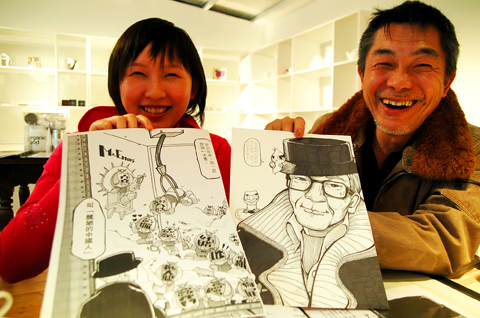A comic-strip version of The Ugly Chinaman, a popular book by human rights activist and writer Bo Yang (柏楊), will be soon be published.
In The Ugly Chinaman, Bo Yang presented controversial, in-depth criticism of Chinese culture, depicting the Chinese as dirty, noisy and vainglorious brown-nosers who are incessantly fighting amongst themselves.
The book came as a shock when it was first published in Taiwan in 1984, said Chang Hsiang-hua (張香華), Bo Yang’s wife.

PHOTO: HSIEH WEN-HUA, TAIPEI TIMES
Although the book was banned in China until 2000, underground copies had spread as far as the Xinjiang region and Heilongjiang Province by then, she said.
In last August, Bo began planning a comic version of the book, saying that it could reach out to young people today, who tend not to read.
The publisher of the comic edition, Hsu Jung-chang (徐榮昌), said he had long been a fan of Bo’s original work.
Jung said he admired Bo’s faculty for critical analysis and that the author’s sharp insight had not faded over the decades.
Cartoonist MoMo — who was born in 1980 and is 60 years younger than Bo — was given the task of drawing the comic version.
MoMo said that the age difference meant that she could reinterpret the classic book from the perspective of a younger generation. She hopes to make the comic version a tool of civic education across generations and national boundaries and pass on Bo’s gift of critical thinking to others.
MoMo, who has worked as a cartoonist for 20 years, has never published a complete comic book.
“When I agreed to take the job, I didn’t know who Bo Yang was and didn’t know how serious it was,” she said.
The only thing that Bo Yang asked from her was to “make it really funny and make him look stupid,” she said.
In the illustrated version of The Ugly Chinaman, Bo will appear as one of the characters, who often argues with others.
Contemporary issues, including campus shootings in the US and the Japanese whaling industry, will be discussed in the book alongside the orginal themes of the problems with Chinese culture.
“The most difficult part is softening the image of Bo Yang, who is a serious person,” MoMo said.
Bo began experiencing serious health problems in September 2006 and he has been in and out of hospitals several times since then. Because of his health troubles, he has stopped writing.
Chang said on Thursday as he visited Bo in the hospital that Bo, who was recently hospitalized again for pneumonia, follows Taiwanese politics closely despite his illness.
Bo, who was a political prisoner for 10 years during the Martial Law era, is disappointed in the Democratic Progressive Party administration, but is worried about the Chinese Nationalist Party’s (KMT) return to power, Chang said.

Chinese Nationalist Party (KMT) Chairman Eric Chu (朱立倫), spokeswoman Yang Chih-yu (楊智伃) and Legislator Hsieh Lung-chieh (謝龍介) would be summoned by police for questioning for leading an illegal assembly on Thursday evening last week, Minister of the Interior Liu Shyh-fang (劉世芳) said today. The three KMT officials led an assembly outside the Taipei City Prosecutors’ Office, a restricted area where public assembly is not allowed, protesting the questioning of several KMT staff and searches of KMT headquarters and offices in a recall petition forgery case. Chu, Yang and Hsieh are all suspected of contravening the Assembly and Parade Act (集會遊行法) by holding

PRAISE: Japanese visitor Takashi Kubota said the Taiwanese temple architecture images showcased in the AI Art Gallery were the most impressive displays he saw Taiwan does not have an official pavilion at the World Expo in Osaka, Japan, because of its diplomatic predicament, but the government-backed Tech World pavilion is drawing interest with its unique recreations of works by Taiwanese artists. The pavilion features an artificial intelligence (AI)-based art gallery showcasing works of famous Taiwanese artists from the Japanese colonial period using innovative technologies. Among its main simulated displays are Eastern gouache paintings by Chen Chin (陳進), Lin Yu-shan (林玉山) and Kuo Hsueh-hu (郭雪湖), who were the three young Taiwanese painters selected for the East Asian Painting exhibition in 1927. Gouache is a water-based

Taiwan would welcome the return of Honduras as a diplomatic ally if its next president decides to make such a move, Minister of Foreign Affairs Lin Chia-lung (林佳龍) said yesterday. “Of course, we would welcome Honduras if they want to restore diplomatic ties with Taiwan after their elections,” Lin said at a meeting of the legislature’s Foreign Affairs and National Defense Committee, when asked to comment on statements made by two of the three Honduran presidential candidates during the presidential campaign in the Central American country. Taiwan is paying close attention to the region as a whole in the wake of a

OFF-TARGET: More than 30,000 participants were expected to take part in the Games next month, but only 6,550 foreign and 19,400 Taiwanese athletes have registered Taipei city councilors yesterday blasted the organizers of next month’s World Masters Games over sudden timetable and venue changes, which they said have caused thousands of participants to back out of the international sporting event, among other organizational issues. They also cited visa delays and political interference by China as reasons many foreign athletes are requesting refunds for the event, to be held from May 17 to 30. Jointly organized by the Taipei and New Taipei City governments, the games have been rocked by numerous controversies since preparations began in 2020. Taipei City Councilor Lin Yen-feng (林延鳳) said yesterday that new measures by